Writing
Ralph 124C 41+
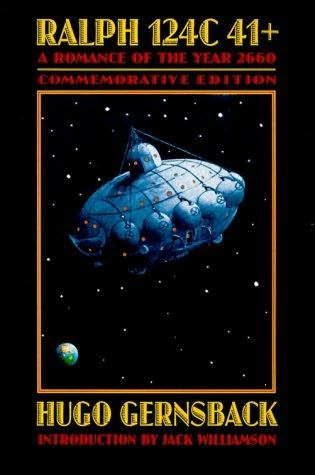
Gernsback's Ralph 124C 41+ first appeared as a 12 part serial in his magazine "Modern Electrics" beginning in April 1911. It was first condensed and published as a novel in 1925, and a second edition came out in 1950. The work is set 600 years in the future, and is a combination of science, romance, and adventure, all the elements Gernsback thought necessary in Science Fiction.
Plot Summary
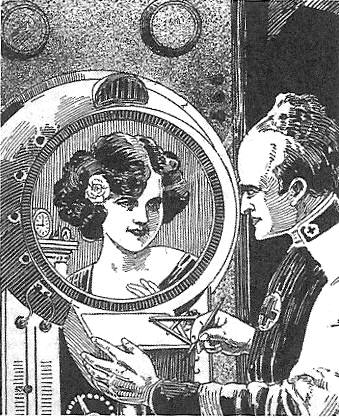
The novel, like many early works of Science Fiction, showcased the protagonist scientist, Ralph 124C 41+, in a heroic role; science is used for the good of mankind. Not only is Ralph incredibly intelligent, as evidenced by the + after his name that only ten men can claim, he is physically and morally superior.
Hero meets heroine, Alice 212B 423, via a confused telephot (videophone) connection. He gives her his only autograph, and in her gratitude Alice travels from Switzerland to New York to thank him in person. The two fall in love and Ralph guides Alice throughout America, introducing both girl and reader to inventions including the scientific super farms and vacation city in chapters II-IX.
However, Alice has also captured the affections of the human Fernand 600 10 and the Martian Llysanorh' CK 1618, who both want to steal Alice from Ralph. He successfully defends her from an invisible attacker in Manhattan, but Fernand manages to kidnap Alice on his spaceship. Ralph subsequently spends chapters X through XVI pursuing first Fernand and then Llysanorth', despite his government's orders to remain earthbound.
The story appears to end tragically, as Alice is killed during the battle. However, Ralph creates a preservative gas, Armatagol, to maintain Alice's body and organs until they return to Earth. The greatest surgeon in the world worked on Alice for hours with every scientific method, but it was a love story that ultimately brought Alice back to life.
Review
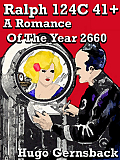
Ralph 124C 41+'s straightforward plot and plain prose make it easy to read, but these positives are also the novel's greatest shortcomings. The plot is predictable, unoriginal, and overly simple. The characters are flat, and unbelievable. As a whole, the novel is reminiscent of adolescent heroic fantasy in combination with exhausting scientific explanation. Thus, while scientifically substantial, Ralph 124C 41+ lacks literary acumen.
However, the unmitigated optimism for the future and incredible range of ideas for scientific and technological discovery and invention evident throughout the novel make it worthy of examination. Despite the uninspired prose, Gernsback's passion for science and Science Fiction fills the novel, and thus his powerful personality lends Ralph 124C 41+ its power, not the impossibly perfect hero.
See Links in Bibliography for professional reviews.
Inventions
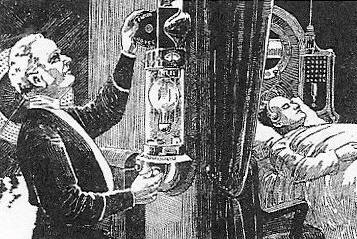
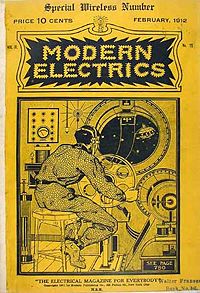
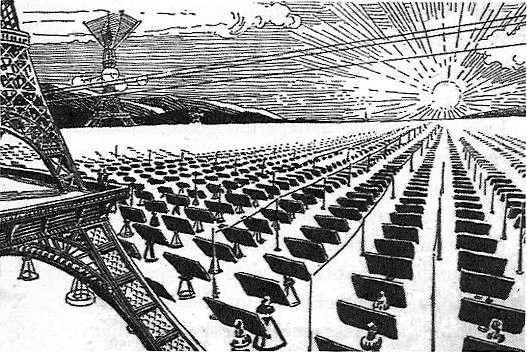
Accelerated Plant Growing Farms: Greenhouse farms w/ 5 harvests/yr
Aeroflyer: Small flying transport that can reach speeds of 600 mph.
Appetizer: Waiting room in restaurants with hunger increasing gas.
Automatic-Electric Packing Machines
Bacillatorium: A decontamination chamber for the home.
Electromobiles: Electric powered car.
Gyroscope: This is used to fly to other planets.
Helio-Dynamophores: Solar panels.
Hypnobioscope: A sleep learning device.
Luminor: An automated lighting system that responds to voices.
Menograph: Records a person's thoughts in writing using mind-script.
Meteoro-Towers: Weather control stations.
Newspaper: A postage stamp sized newspaper.
Packet-Post Conveyer: Underground postal system w/ conveyor belts.
Permagatol: A green gas that preserves organic matter indefinitely.
Phonolphabet Machine: A voice recorder.
Platinum-Barium-Arturium Eyeglasses: X-Ray glasses that detect Radium
Pulsating Polarized Ether Wave: Radar.
Radioperforer: Gun that shoots radium beams to stun or kill.
Signalizers: A searchlight guidance system
Space Flyer: An interplanetary flying machine using gyroscopes.
Subatlantic Tube: Underground train that uses magnetism
Telautograph: Fax machine.
Telephot: Picture phone w/ universal translator.
Tele-Theater: Like television, but made up of many telephots
Vacation City: A domed city suspended 20,000 feet in the air.
Other Novels

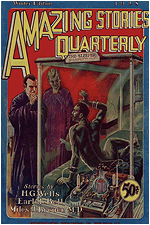
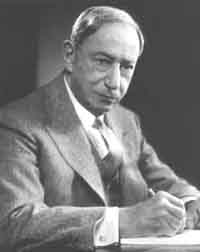
Gernsback wrote two other novels: Ultimate World and The Scientific Adventures of Baron Von Munchausen. The former was written in 1959 and published in 1972. It revolved around an alien invasion plot, but was not well received. The latter is actually a collection of stories written for the "Electrical Experimenter" and appeared sporadically in the publication from 1915-1917. The collection was eventually published as a whole in 1928, after significant editing by T. O'Connor Sloane. Each story is based around the idea that Baron Munchausen survived into the 20th century, and discovers a way to travel through space. The articles detail Munchausen during World War I, his pedantic exploration of the moon, and finally his stint in a future Martian Utopia.
Like Ralph 124C 41+, both works are not considered to have literary value, and instead rely upon fantastic, and often accurate, predictions and inventions for their worth. In fact, Gernsback's final two novels depart almost entirely from plot and focus excessively upon scientific explanations and potential inventions.
Any shortcomings in his writing style do not detract from Gernsback's immense contribution to Science Fiction, and many of his literary shortcomings are understandable. Primarily an editor of non-fiction, scientific or technical magazines, Gernsback would naturally write in informative, familiar patterns. Further, Hugo may have felt the need to justify the appearance of his fiction in non-literary magazines by making them as scientific as possible.
Short Fiction
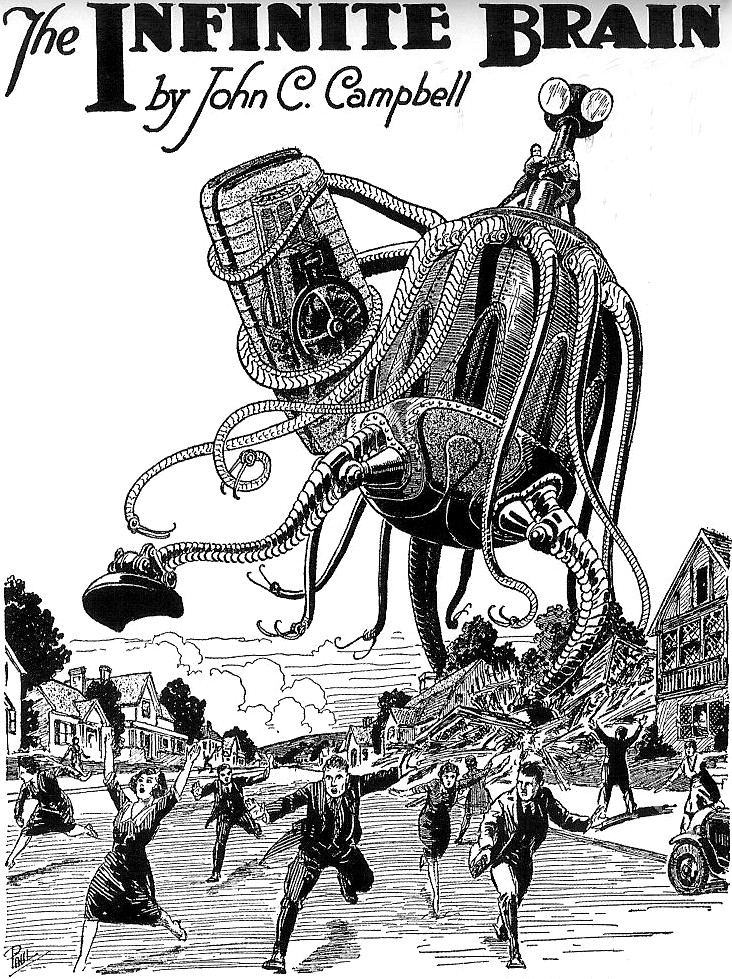
"The Electronic Duel"--Two Italians fighting over a woman agree to a duel in which they wear helmets connected to a power line and attempt to push the other off a platform.
"The Killing Flash"--The loser in a rivalry plots to kill his nemesis by calling the man and sending a powerful electric current through the phone line.
"The Infinite Brain"--The scientist protagonist leads a crew to Mars and describes the Utopian society he finds there.
"The Radio Brain"--A man with a metal plate in his head discovers that he can hear radio broadcasts.
"Extra Sensory Perfection"--A man experiencing health problems from an idea trying to escape his brain eventually realizes that the wonderful idea is to write this story.